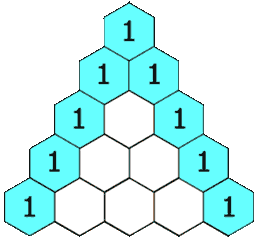同步操作将从 doocs/leetcode 强制同步,此操作会覆盖自 Fork 仓库以来所做的任何修改,且无法恢复!!!
确定后同步将在后台操作,完成时将刷新页面,请耐心等待。
Given an integer numRows, return the first numRows of Pascal's triangle.
In Pascal's triangle, each number is the sum of the two numbers directly above it as shown:

Example 1:
Input: numRows = 5 Output: [[1],[1,1],[1,2,1],[1,3,3,1],[1,4,6,4,1]]
Example 2:
Input: numRows = 1 Output: [[1]]
Constraints:
1 <= numRows <= 30First, we create an answer array $f$, and then set the first row of $f$ to $[1]$. Next, starting from the second row, the first and last elements of each row are $1$, and the other elements are calculated by $f[i][j] = f[i - 1][j - 1] + f[i - 1][j]$.
The time complexity is $O(n^2)$, and the space complexity is $O(n^2)$. Here, $n$ is the number of rows.
class Solution:
def generate(self, numRows: int) -> List[List[int]]:
f = [[1]]
for i in range(numRows - 1):
g = [1] + [a + b for a, b in pairwise(f[-1])] + [1]
f.append(g)
return f
class Solution {
public List<List<Integer>> generate(int numRows) {
List<List<Integer>> f = new ArrayList<>();
f.add(List.of(1));
for (int i = 0; i < numRows - 1; ++i) {
List<Integer> g = new ArrayList<>();
g.add(1);
for (int j = 0; j < f.get(i).size() - 1; ++j) {
g.add(f.get(i).get(j) + f.get(i).get(j + 1));
}
g.add(1);
f.add(g);
}
return f;
}
}
class Solution {
public:
vector<vector<int>> generate(int numRows) {
vector<vector<int>> f;
f.push_back(vector<int>(1, 1));
for (int i = 0; i < numRows - 1; ++i) {
vector<int> g;
g.push_back(1);
for (int j = 0; j < f[i].size() - 1; ++j) {
g.push_back(f[i][j] + f[i][j + 1]);
}
g.push_back(1);
f.push_back(g);
}
return f;
}
};
func generate(numRows int) [][]int {
f := [][]int{[]int{1}}
for i := 0; i < numRows-1; i++ {
g := []int{1}
for j := 0; j < len(f[i])-1; j++ {
g = append(g, f[i][j]+f[i][j+1])
}
g = append(g, 1)
f = append(f, g)
}
return f
}
function generate(numRows: number): number[][] {
const f: number[][] = [[1]];
for (let i = 0; i < numRows - 1; ++i) {
const g: number[] = [1];
for (let j = 0; j < f[i].length - 1; ++j) {
g.push(f[i][j] + f[i][j + 1]);
}
g.push(1);
f.push(g);
}
return f;
}
impl Solution {
#[allow(dead_code)]
pub fn generate(num_rows: i32) -> Vec<Vec<i32>> {
let mut ret_vec: Vec<Vec<i32>> = Vec::new();
let mut cur_vec: Vec<i32> = Vec::new();
for i in 0..num_rows as usize {
let mut new_vec: Vec<i32> = vec![1; i + 1];
for j in 1..i {
new_vec[j] = cur_vec[j - 1] + cur_vec[j];
}
cur_vec = new_vec.clone();
ret_vec.push(new_vec);
}
ret_vec
}
}
/**
* @param {number} numRows
* @return {number[][]}
*/
var generate = function (numRows) {
const f = [[1]];
for (let i = 0; i < numRows - 1; ++i) {
const g = [1];
for (let j = 0; j < f[i].length - 1; ++j) {
g.push(f[i][j] + f[i][j + 1]);
}
g.push(1);
f.push(g);
}
return f;
};
此处可能存在不合适展示的内容,页面不予展示。您可通过相关编辑功能自查并修改。
如您确认内容无涉及 不当用语 / 纯广告导流 / 暴力 / 低俗色情 / 侵权 / 盗版 / 虚假 / 无价值内容或违法国家有关法律法规的内容,可点击提交进行申诉,我们将尽快为您处理。